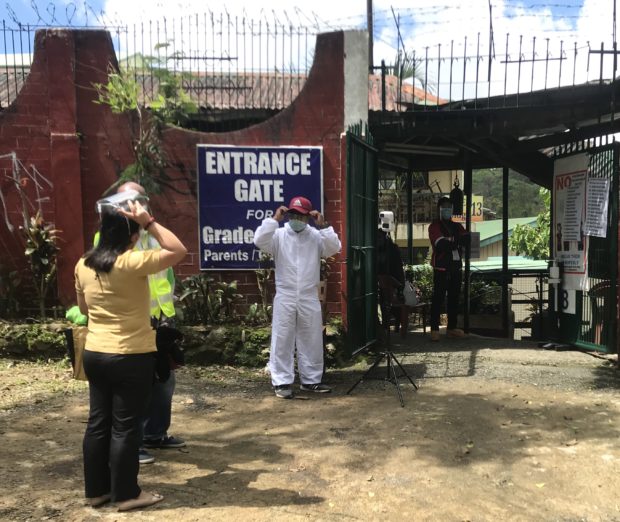
MEET THE PARENTS Parents attend orientation meetings with teachers in Baguio City’s schools at the start of the new school year last week. —VINCENT CABREZA
BAGUIO CITY, Benguet, Philippines — Close to 20,000 teachers and teaching personnel in the Cordillera region must be prioritized for vaccination given the risks they now take with the start of the new school year under the COVID-19 pandemic, officials said on Monday.
Although lessons will be delivered to the residences of students, teachers still have to personally meet their parents or guardians during the first weeks of orientation and the subsequent schedules when they can fetch and then send back printed workbooks, said Estela Cariño, Cordillera director of the Department of Education (DepEd), in a press briefing.
Teachers have started lining up at vaccine sites as their respective communities began giving jabs to essential workers listed in the A4 category, Cariño said.
She said 17,305 teachers and 3,419 nonteaching staff and teaching-related employees would need to be inoculated now that the 2021-2022 school year had begun.
As of Sunday, hospitals in Mountain Province, Benguet, Ifugao, Kalinga, Abra and Apayao were treating 8,927 active COVID-19 cases out of the regional total of 64,356 patients since the pandemic began last year.
Around 40 teachers were also placed under medical surveillance after they participated in a recent seminar on digitizing lessons that was given by a DepEd delegation from Manila. They were all exposed to a 30-year-old virus-infected participant of the seminar from this city who later died.
The region’s hospital care utilization rate has been classified as critical, including that in Baguio, which still has 3,196 active cases out of its total 21,595 patients since 2020.
Dilemma
The DepEd has decided to cut down pupils’ reliance on printed workbooks this school term to ease or curb teacher exposure, Cariño said.
Because of poor connectivity in the mountain region, all Cordillera pupils preferred printed “self-learning modules” last year, the first school period during strict quarantines.
These modules need to be distributed physically to households and often require parents and guardians to get these workbooks from the teachers. The modules are also returned to schools so teachers can measure how well pupils grasped the lessons.
“Our dilemma is we want to do things online. But even parents can’t go online. We started out with online orientation last week but the turnout was only five percent of the parents in my school,” said a Baguio high school principal who asked not to be named for lack of authority to speak to reporters.
Limited in-person classes
“So we oriented them face-to-face in four batches per grade level. That meant meeting physically with 30 people per section per hour. My school has 2,400 learners,” the principal said.
The principal said her school’s employees had received their jabs except for six pregnant school employees who work from home five days a week. City Administrator Bonifacio dela Peña said they also asked universities to reduce in-person classes for medical-oriented courses.